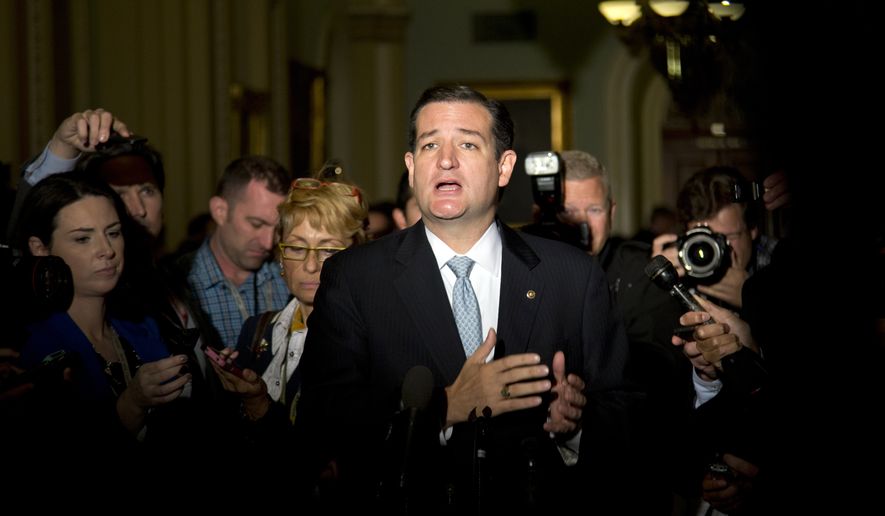The competition to be the next Ted Cruz is extremely hot within the Republican Party, where a number of emerging challengers are hoping to capitalize on the newest brand name in conservative politics.
In Kansas, Milton R. Wolf opened his fundraising pitch to supporters last week by asking them whether he could be the next Cruz candidate. In Mississippi, Chris McDaniel announced his campaign to unseat Sen. Thad Cochran last week and welcomed the comparison to Mr. Cruz, calling it “a compliment.”
Then there’s Ben Sasse, a university president running for Nebraska’s U.S. Senate seat, who set state fundraising records by opposing Obamacare. He told the Lincoln Journal Star last week that he would have voted with Mr. Cruz to keep the government shut down last week, saying it was a better option than continuing to spend and run up debt.
“They’re tapping into the anti-establishment feelings that are really running high among Republican primary voters,” said Ron Bonjean, a GOP consultant.
In many ways, Mr. Cruz has become the shorthand for the “tea party,” which was already a shorthand way to categorize conservative voters who subscribe to a low-spending, low-taxes philosophy of government.
Mr. Cruz also became a shorthand for tactics after he led a 21 hour, 19 minute filibuster in September and insisted that fellow Republicans refuse to fund the rest of government until President Obama agreed to cancel the Affordable Care Act.
SEE ALSO: Dick Cheney calls tea party a boon to GOP
In the minds of voters, and even for many lawmakers in Washington, the policy and the tactics have become one and the same.
Online message boards are full of comments from tea party supporters calling for the ouster of Republican Party leaders, and vowing to support only those who espouse a tea party philosophy.
Mr. Cruz came from behind in polls to win the Republican nomination for Senate over a wealthy, establishment-backed candidate, then easily won the general election in 2012.
While attacked by most Democrats, many pundits and even some Republican leaders, Mr. Cruz is in the mainstream for rank-and-file Republican voters, according to Democracy Corps, a Democratic company run by James Carville and Stan Greenberg.
Polling at the height of the shutdown, Democracy Corps found that Mr. Cruz is wildly popular among tea party adherents and, while not necessarily well-known among evangelical Republicans, is popular among those who can identify him.
“Even as pundits label Cruz as ’fringe,’ it is critical to remember that this is only true when talking about the national electorate,” the pollsters said. “In his own party, there is nothing ’fringe’ about Ted Cruz. He is right at the center.”
Many of the groups that allied with Mr. Cruz in pushing to defund Obamacare now are backing candidates who seek to join him as reinforcements.
In Mississippi, Mr. McDaniel has won the backing of the Club for Growth, the Madison Project and the Senate Conservatives Fund in his bid to unseat Mr. Cochran, who voted for last week’s debt and spending deal. Mr. McDaniel told National Journal that he would “certainly consider that a compliment” to be called the next Ted Cruz.
The Senate Conservatives Fund announced Tuesday it was backing Mr. Sasse in Nebraska, and SCF and the Madison Project already have backed businessman Matt Bevin in his Kentucky primary challenge to Republicans’ Senate floor leader, Mitch McConnell.
Being a tea party candidate has showed mixed results in the past two elections. In 2010 and 2012, it proved to be a good way of unseating Republican incumbents in primaries, though those candidates’ records were mixed in the general election.
Mr. Bonjean said it’s still an open question whether embracing Mr. Cruz or his tactics will be a winning strategy for 2014.
“The goal in winning a Senate race is you first have to get through the Republican primary,” Mr. Bonjean said. “The question is if, when you get through a Republican primary trying to get to the hard right, will those candidates moderate their tone in order to appeal to mainstream voters in their state?”
Indeed, Democrats were salivating at the prospect of Republicans nominating Cruz-like candidates.
“Do the math. Trying to out-Cruz Ted Cruz may be a winning GOP primary strategy in the South, but for anywhere else, it means Majority Leader Harry Reid for a long time to come,” said Christy Setzer, a Democratic strategist and president of New Heights Communications.
In the case of Mr. Wolf, embracing Mr. Cruz may not be much of a distinction anyway. Sen. Pat Roberts, the incumbent Mr. Wolf is challenging, also voted against last week’s debt deal and even came to the floor during Mr. Cruz’s filibuster last month to help out, using nearly a half-hour of the filibuster.
Mr. Wolf has other ways to get attention outside of Cruz cloning. He is a second cousin to President Obama, which, as a conservative pundit, earned him a decent amount of ink.
• Stephen Dinan can be reached at sdinan@washingtontimes.com.




Please read our comment policy before commenting.